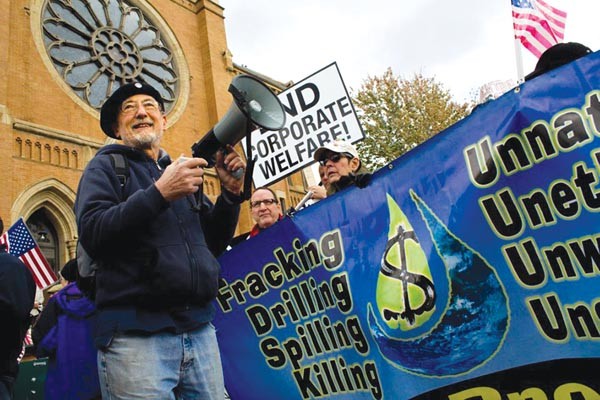Someone has been shouting "get a job!" at Vincent Eirene since he was a little boy.
The thing is, he does have a job. Eirene is a lifelong activist, plying his trade at protests, speeches and actions, and running a house for the homeless supported from his own pocket and community donations. But, like many protest pros around Pittsburgh will tell you, his calling comes with a price, financial and otherwise.
"It's like the Catholics: We take a vow of poverty," says Eirene, 60. "It sounds noble but in reality, I'm broke."
Supporting oneself by supporting a cause is rarely a lucrative career move. One year, for example, Eirene said he was "lucky" if he pulled in $8,000. Helen Gerhardt, an organizer for Pittsburghers for Public Transit, gave up her apartment to live at Occupy Pittsburgh's Downtown encampment last year, and has lived in her car between organizing jobs. Joyce Wagner, former board chair of the national Iraq Veterans Against the War, has found herself facing foreclosure.
Others, like peace and social-justice activist Celeste Taylor, do their own fundraising and compete for paying jobs in the organizing field, while working other gigs: Taylor's work history includes stints as a floral designer and administrator of the Friends Meeting House.
And while there is little financial security for those whose work-day tools include a protest sign, few can imagine pursuing any other way of life.
"I always thought it was honorable work and you should be good at it," says Taylor, who most recently served as the regional coordinator for the Pennsylvania Voter ID Coalition. "It's not a place to plunk yourself down and make money."
Jodi Hirsh, sole founder of JustAction LLC — an Edgewood-based consulting agency whose work includes advocacy and grassroots campaigns — agrees. "I'd be miserable doing anything else," she says.
Hirsh has faced financial uncertainty, the anxiety of not knowing when her next paycheck would arrive. "As an independent contractor, you never know what's coming," she says. "I spent all of November and December nervously biting my fingernails."
Contracts eventually came, enough to stay afloat with the help of her partner's full-time job and health benefits, which also help cope with the responsibility of raising two children under the age of 4.
Having young kids can complicate advocacy work in other ways, since meetings and actions often take place on evenings and weekends. "People will say something is kid-friendly, but there's nothing for kids to do," says Wagner, who has a 3-year-old son. "You often find meetings start at times when children need to sleep or eat."
When Wagner was single, "I could scrape by with less," says the North Side resident. "Now I have a lot more responsibility to feed, clothe and shelter another person."
Wagner has taken some time off from activism, which allows her to work as an ironworker apprentice, and to spend time with her son. As an activist, burn-out is an occupational hazard, she says: "You're ineffective unless you're taking care of yourself and your basic needs are met."
Taylor agrees that there are times activists get overwhelmed, and that balancing family considerations can be difficult. "Sometimes I wonder if I should have made different choices so I could have done different things with my children."
"A lot of activists' families probably feel rejected and not given the same kind of weight or importance that political causes are," says Gerhardt, of Wilkinsburg. Gerhardt has held a handful of organizing jobs since serving in Iraq with the Army National Guard; her work week sometimes eclipses the 60- or 70-hour marks.
Her current contract with Pittsburghers for Public Transit, paid for by the Amalgamated Transit Union, is only temporary. And she admits, "I often think about getting a stable, professional job and just doing this part time," adding she plans to re-evaluate within the next year.
Even so, Gerhardt says, activism "is a tight-knit community," offering work that is "incredibly interesting and satisfying."
Activists believe that kids with activist parents enjoy some benefits, too — like being exposed to different ideas and people. Mel Packer, a Point Breeze veteran protester who just retired as a physician's assistant, worked part time to help take care of his family. Taylor, a mother of four, recalls taking her twins to a rally in Topeka, Kan., on the anniversary of Brown vs. the Board of Education.
Activism has also brought families together. Packer, for example, met his wife, Emily De Ferrari, through political organizing.
Such personal rewards, activists say, transcend having elaborate lifestyles. Eirene, for one, says he deliberately lives simply. For 35 years, he supported himself through his light-hauling business, which he started in 1977 and stopped two years ago when he got on disability for injuries sustained after getting struck by a vehicle.
Eirene protested on behalf of various causes in college in the 1970s: the United Farm Workers, rebuilding Bach Mai Hospital in Vietnam, and racial equality. And while the cost of living was cheaper with a $75 apartment rent split three ways, he says, even then "it seems like it was always a struggle" to get by.
In 1977, he started a house to take in homeless people in the community, which he financed with personal funds and contributions for the next 35 years. While limited income was due in part to Eirene's activism, it was also partly by design.
"I thought that my activism would be more effective and unlimited, if I wasn't being paid by someone telling me what to do. Nobody can tell you what to do when you're hauling garbage."
Coupled with more than 70 arrests for civil disobedience, and having spent more than two-and-a-half-years in jail all told, Eirene's finances are complicated, to say the least. But he wouldn't have it any other way.
"It just didn't add up, yet everything was fine," Eirene says. "You have more money in your account if you don't check it."


